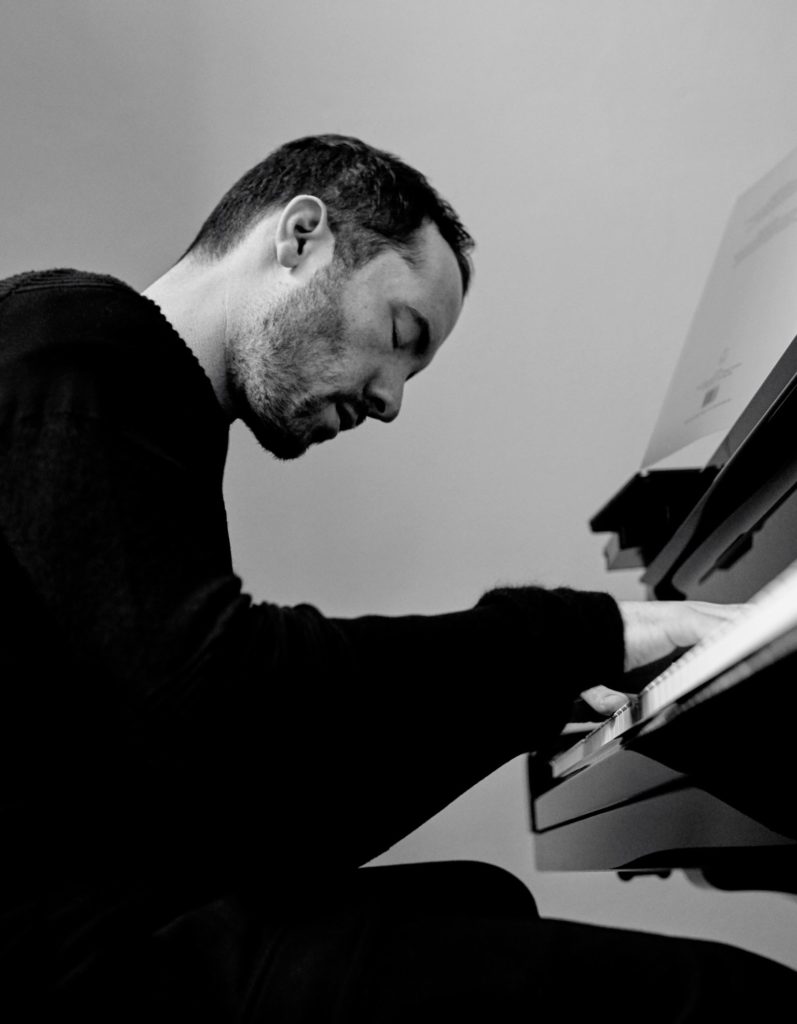Levit creates a mesmerizing Beethoven landscape with final three sonatas
Not all marathons are created equal. Some are rowdy sporting events. Others are more cerebral artistic endeavors. There is a wide variety among the latter, too, as Igor Levit’s Saturday night recital at Jordan Hall demonstrated.
The Berlin-based keyboardist’s program consisted of just three pieces: Ludwig van Beethoven’s Piano Sonatas Opp. 109, 110, and 111. Together, they were projected to run a decidedly un-Wagnerian seventy minutes (in the event, Levit’s flowing tempos brought the intermission-less performance in a couple minutes under the anticipated duration).
Yet such was the unprepossessing virtuoso’s grasp of the music that each piece inhabited a world all its own. Taken together, the evening delivered an abundance of Whitmanesque multitudes.
Of course, Levit is no stranger to Beethoven’s keyboard works. His recording of these late sonatas a decade ago, made when the pianist was just 26, gave lie to the supposition that this fare is best left to seasoned professionals. In the ensuing ten years, Levit’s conception of the composer’s music has only deepened and become more flexible.
This was evident on Saturday from the opening bars of the E-major Sonata (Op. 109). For improvisatory-like phrasing in the first movement, one could hardly have asked for more.
Indeed, Levit’s blend of crisp rhythms, lucid textures, and painterly colors provided the Vivace an absorbing inwardness. Meanwhile the Prestissimo, some initial blurriness aside, offered a lively play of dynamic contrasts and impish spirit.
Much the same followed in the concluding Andante, its “Gesangvoll” (“songful”) theme floating with featherlight inevitability. The subsequent variations unfolded with a near-flawless attention to balance, shape, and character, Levit seamlessly shifting between sequences of unadulterated lyricism, dancing counterpoint, and radiant trills.
His account of the Sonata No. 31 was notable for embracing the score’s sense of wonder and sheer invention. The first two movements were smartly shaped and characterful, as well as richly colored.
But it was the Sonata’s concluding pair—the mellifluous “Arioso dolente” and the astonishing Fugue—with their attendant references to Beethoven’s “La Malinconia” quartet that provided one of the night’s high points.
Levit dispatched the recurring strains of the former with a fervency that was palpable: unaffected, resonant melody from start to finish. The latter, smartly directed, cleanly voiced, and kaleidoscopically shaded, simply suffused joy.
The ovation that followed the last chord was as inevitable as it was unfortunate, the audience’s applause momentarily breaking the spell the pianist had cast over the course of the first two sonatas (they were played without a break).
Accordingly, the introduction to Op. 111’s first movement took some time to settle. Once it did, the Allegro proper’s swirling, demoniacal climaxes didn’t disappoint: Levit’s command of his instrument boasted orchestral sweep.
But, even here, the movement functioned as little more than an introduction to the epic, closing “Arietta” with its visionary series of variations. These several—by turns devotional, sprightly, and shimmering—emerged with a breathtaking degree of structural naturalness, textural clarity, and thematic logic.
Also, gradations of piano: much of the intimacy of Levit’s performance on Saturday derived from the rhythmic and tonal precision of his playing in softer dynamic ranges, nowhere more so than in this movement. To be sure, such was the focus of the finale’s stratospheric, music box-like episodes (played so quietly one could faintly hear the mechanics of the piano hammers) that they took on a mystical, otherworldly aspect.
Afterwards, the packed hall responded with thunderous applause. Throughout the night, Saturday’s audience was remarkably reverent (a couple of distracting cell phone alerts and quickly silenced calls notwithstanding); nary a cough or shuffle disturbed the evening’s proceedings. Even so, somewhere behind me, a patron wondered aloud how many encores Levit might offer.
The answer, rightly, was none: after performing the last three Beethoven sonatas, there’s nothing left to play. Levit knew this, taking three curtain calls before bidding the night’s house a well-earned adieu.
The Celebrity Series presents “Rising,” with tenor Lawrence Brownlee and pianist Kevin Miller at 3 p.m. Sunday at GBH Calderwood Studio. celebrityseries.org
Posted in Performances

Posted Mar 06, 2023 at 10:24 am by Joel Stein
On the subject of encores after such spiritual music, I traveled to NYC the morning after hearing Levit and heard the Vienna Philharmonic play Bruckner 8 at Carnegie. With the last notes still in my head, Thielmann elected to encore a Strauss waltz. For me it was awkward and unwelcome.